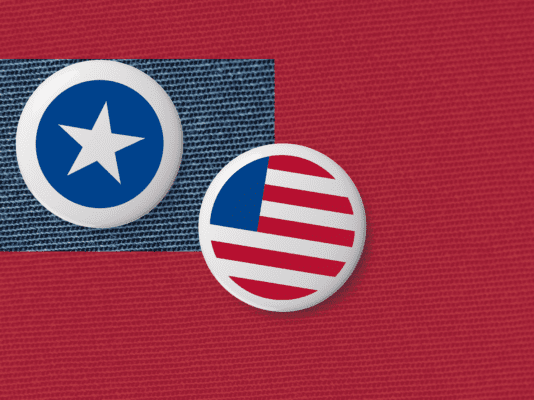One of my favorite movies as a kid was It Takes Two. Mary Kate Olsen plays a tough and lively foster kid who lives in a group home. One day she fatefully meets her lookalike—Ashley Olsen—and they play cupid with the adults in their lives.
Though it isn’t the focus of the movie, the Olsen twins unwittingly taught me an assumption about foster care: foster kids desperately want to be adopted because they have no family of their own.
Fast-forward to my 30s, and I now understand that foster care in the real world is very different than foster care in the Olsen world. In reality, the Mary Kates of the world don’t just appear in the system. They have a backstory.
The day Jay came home
My husband (Cole) and I felt called to foster care early in our marriage. After the training, paperwork, and home studies, the phone call finally came. Overnight, we became foster parents to an 11-month-old, Jay*, who was living in a car with his mom and siblings.
Week in and week out, Jay had regular appointments to see his biological mom, Krista*. At first I didn’t know how to interact with her. My heart was hard. I’d think, "How could you let things get this bad?"
I was proud. And the subtle, well-meaning comments that flooded my ear only amplified the pride: Thankfully he won’t remember any of his past! I’ll pray the Lord lets him stay. Look at where he comes from and where he is now, with you and Cole. God is so redemptive!
How proximity changed me
As the appointments came and went with Krista, I started noticing little things about her that reminded me of Jay. Funny, endearing, sassy things that put a smile on my face despite my defenses. They were soft reminders that the little things I loved about Jay had come from her; that she was his mom.
Then I’d get distance, and it’d get hard again. Sure, Krista is Jay’s mom. But she made really bad choices, which is why I’m here. The battle raged inside—in one moment, I’d see her as the enemy and the next I’d see her as an ordinary person.
Time passed, and so did the weekly interactions with Krista. Each visit, she’d open up a little more, entrusting me with another little piece of her story. One day, she called the local prison so the father of the kids could have a chance to talk to them. I’ll never forget how their faces beamed upon hearing his voice. They were too excited to notice how defeated it sounded.
The phone call ended. Suddenly, Krista doubled over in anguish, wilting in her chair. Her tears poured out in a deluge, her voice cracked in pain, and her clenched fists turned pale as they beat against her chest. She tried to hunch over to avoid the stares, but the river of grief wasn’t letting up. She missed her kids and Jay’s dad. She wanted things to change. She was trying so hard and didn’t have any help. She couldn’t keep going.
In a flash, Cole was by her side in the seat next to her—a shield between her and the stares. He wrapped her up in a bear hug and whispered, “We’re in your corner. We know you’re fighting so hard, and we see how much you love these kids. We talk about you all the time with Jay. You’re not alone. We are right here with you, Krista.”
It was a moment of strength and protection and dignity and brotherly warmth—of all the things incarnation should be. Before I realized it, I was now on the other side of Krista, my own eyes hot with tears and my hand clutching hers. I certainly had not planned on “weeping with those who weep” that day, but God had. Somehow, he reflexively drew near to the brokenhearted through me—the hardhearted.
Krista’s wilted body lifted, and her eyes to ours, the slightest spark of hope peeked through the tears. Her eyes said everything: Maybe they aren’t trying to take my kids. Maybe they remember me when I’m away. Maybe I can be a mom again.
In that moment, God showed me what dignifying a person looks like. And he also showed me that adoption isn’t the only beautiful picture of the gospel. Fighting to see a family restored is, too.
The competing voices
The father’s voice on that phone call and Krista’s wailing voice—I couldn’t get them out of my head. They want to be the parents. They want their kids back. And their kids want them. They are doing everything the courts have mandated.
And then the other well-meaning voices would chime in. You’re a better fit. You’re the answer. You are God’s provision. You should probably adopt them. This embodies the gospel.
The two voices were now competing at a volume that I couldn’t ignore anymore. The problem was that now, Krista wasn’t a nameless, faceless person. She was in my life on a weekly basis. I cared about her now, loved her even. I saw the pain and the bond and the strength of a mother in her, and I couldn’t unsee it.
Proximity had given way to compassion, and I had to face the truth: as much as I loved Jay to the depth of my soul—and heaven knows I love that little boy to a painful point—he wasn’t unloved before I came along. He had experienced the fierce love of a mother long before he ever saw my face. Krista was the backstory the Olsen twins forgot to tell me about, and knowing the backstory changed everything.
Taking an honest look
A voice of “counsel” came crashing in one day on a phone call. Yeah, but look at where Jay comes from, Ashley. He was taken from the back of a car. He can’t go back to her.
“Exactly. Look at where he comes from,” I countered. “Look at his mother. And everything she’s up against.” I had finally assembled all the fragments of the story, and the words poured out of me before I knew they were in me:
Listen, maybe Krista was abused as a kid. Maybe Jay’s dad was wrongly incarcerated—locked up for something your high school buddies simply got warnings for—which left her alone. Maybe she’s worked a low-paying job for years and no one will give her a raise or a higher-paying job because of her lack of education. And maybe she couldn’t get access to education anyway—access that was easy for you to get. And maybe her inability to make more money forced her to choose between food and shelter for her kids, and she chose food. And maybe that’s why they were all in the back of a car. And maybe all of that hardship made her snap. And you know what? Maybe we would have done the exact same thing in her shoes.
I paused to gain some composure, trying to make sense of what had just come out of my mouth. Where I had once been suspicious of Jay’s mom, I was now outright advocating for her. Where did all this loyalty come from? What was going on here?
The voice on the phone took a moment before some lowly words emerged. Well, I didn’t know all of that. I thought she had just put her kid in a horrible circumstance for selfish reasons or something. I wiped my eyes and was honest: “I did too. Until I got to know her.”
Jesus teaches us that the Good Samaritan—the one who truly loves his neighbor—is anyone who simply crosses the road. Instead of “going by on the other side” as to avoid pain or reality, Jesus says we should come near. With Krista, God had shoved me to the other side of the road where I found something unexpected: a human being. A back-against-the-wall, exhausted, bruised, scared, trying to do the best she could, human being. When I finally got close enough to “look at where Jay comes from,” I saw the imago dei staring back at me.
Yes, Krista made poor choices, but proximity showed me that sin wasn’t the only part of her story. Suffering and crisis were too. And Jesus draws near to people in crisis. Krista taught me that being like Jesus doesn’t simply mean ministering to a child. It means ministering to a family. It means dignifying all the people involved, and working to solve everything that led to the removal in the first place.
Now, not every family gets back together. In some cases, foster children genuinely need an adoptive family—and the church should be providing that. But if Krista taught me anything, it’s that the Olsen twins largely had it wrong. A lot of times, foster kids do have a family long before we ever come in the picture, and their goal isn’t always to be adopted. A lot of times, their deepest desire is to simply go home. And dignifying their parents is the first of many steps in helping them get there.
* The names Jay and Krista are pseudonyms for privacy purposes.









